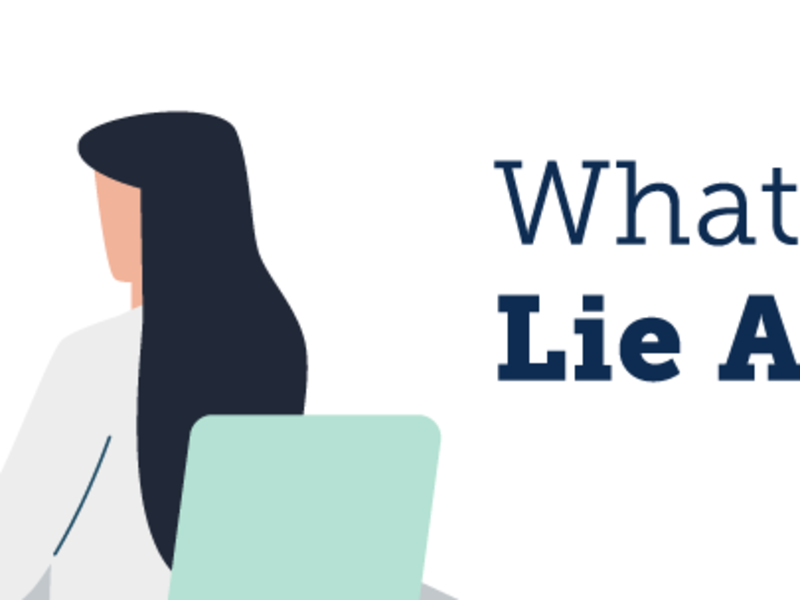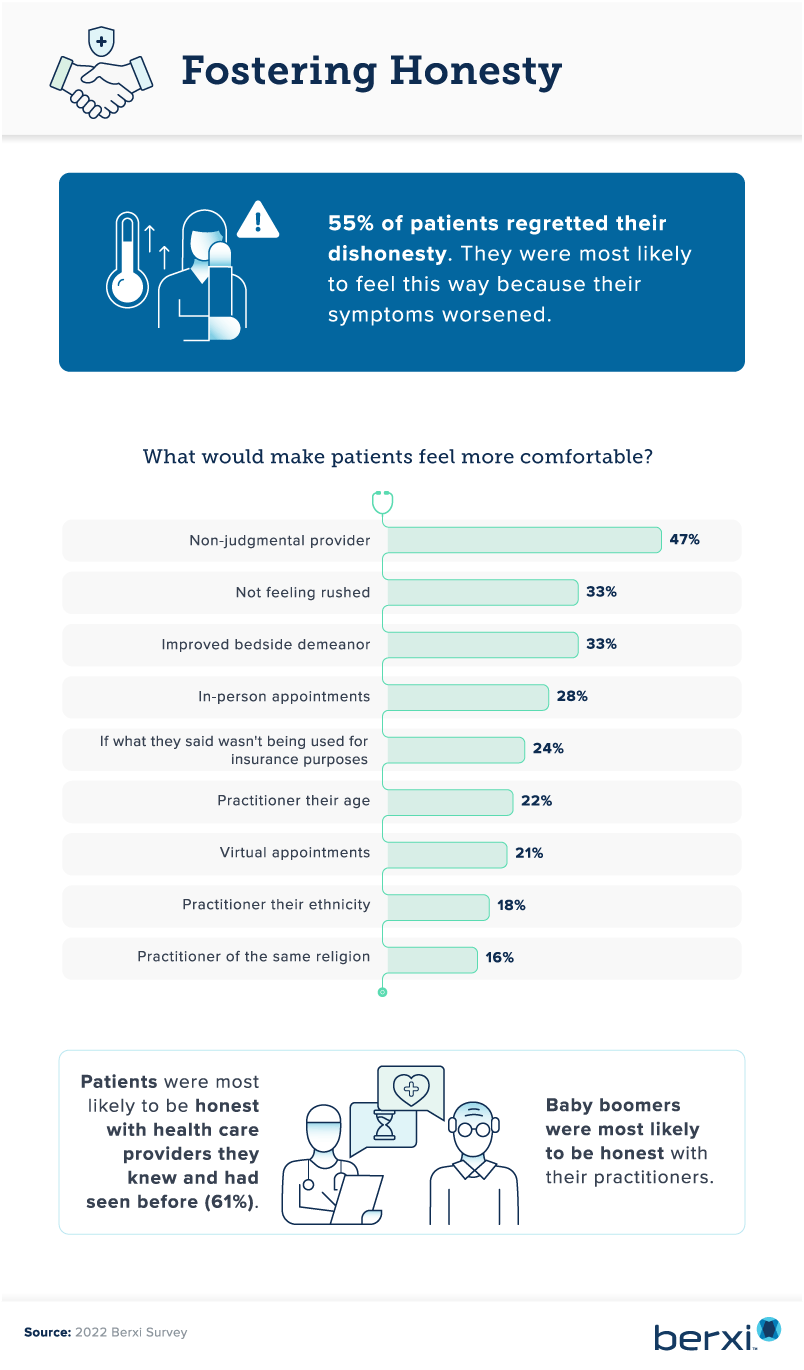
Key Findings
-
77% of patients have lied about their health either directly or by omission when seeing a healthcare provider.
-
Gen Z men were most likely to lie to a provider.
-
Fear of judgment is the no. 1 reason patients report being dishonest.
-
Of the 23% of patients who were completely honest with health care providers, 64% didn’t always feel heard.
-
6 in 10 patients were most likely to be honest with health care providers they had seen before.
Fib. Lie. Omission. Exaggeration. No matter what you call it, you’re not telling the truth. And when it comes to healthcare and receiving the best medical care, patients are overwhelmingly opting for a restricted version of the truth, even if it compromises their health. But why are they doing it? And what are they lying about? Their reasons vary, but many worry about being judged for their health and lifestyle choices. Others admit to exaggerating their symptoms to receive a particular medication or treatment. It’s a tricky situation that pushes some patients to be less than honest with practitioners about their conditions, activities, and histories.
It’s no lie that quality medical care relies on a foundation of honesty and understanding between patient and practitioner. It’s essential for patients to speak the truth and for practitioners to listen without judging what they hear. We surveyed over 1,000 patients to determine their experiences when it comes to communication between patients and providers. We hope our findings will help lay the groundwork for improving trust and honesty in healthcare settings.
Truth Bending in the Medical Setting
Opening up to a practitioner is a vulnerable experience that sometimes leads people to stretch, downplay, or omit the truth. In this first part of our study, we uncover common subjects and motivations leading to dishonesty.

Our study revealed patients are most likely to be dishonest about their lifestyles, particularly their alcohol consumption (25%), eating habits (23%), exercise routine (23%), and sexual history (21%). Others (20%) admitted to lying about their symptoms. Overall, patients were most likely to be dishonest with practitioners in telehealth settings (48%). Since the onset of the COVID-19 pandemic, telehealth providers have grown in popularity. One possible downside to that growth, however, may be that patients are more comfortable withholding the entire truth from their healthcare provider when they are behind a computer screen.

Overall, when patients colored the truth, they did so mostly due to fear of judgment (33%), embarrassment (31%), or shame (24%). Another 21% said they lied because they felt judged by a previous medical professional, while 19% said they were in denial and avoiding the truth.
Patients may also lie due to fear of insurance records (15%). Now that most records are digital, patients may fear their personal information being leaked. Others may fear health insurance costs increasing or the impacts of a new pre-existing condition.
But another revelation occurred in this study. Patients across generations lied due to a preconceived notion of distrust in medical providers' expertise or ability to understand nuances, seemingly feeling they knew more than their providers. “I felt that the questions being asked were irrelevant to the issue being dealt with. I didn’t want to answer and have it become a distraction,” said one 64-year-old male patient.
He was not alone. “A number of times, I have withheld medical history because if I communicate past health issues, they will disregard a new problem and assume they’re related when I know they’re not,” admitted a 44-year-old female patient. And “I didn’t want them to think my health issues were due to feeling depressed because they’d discount my feelings,” said a 29-year-old woman.
Some patients may withhold health information because they feel it isn’t relevant to the issue at hand. Although patients likely know their own bodies best, providers need a full picture to effectively diagnose and treat patients. Their knowledge and experience can help make connections between symptoms that the average person cannot.

As beliefs differ between cultures, religions, and generations, some groups more than others may feel a greater need to lie. This may also be true of different genders: Men were 7% more likely than women to be dishonest with health care professionals – perhaps because men tend to be more confident liars. Meanwhile, Gen Z was the generation most likely to cover up the truth, especially about their sexual histories. Gen Z tends to prioritize personal development over sex, which could explain why they’re more shy about the topic.
However, the youngest generation wasn’t alone in dishonesty; each generation seems to have unique insecurities. Millennials were most likely to lie about their exercise habits, while Gen Xers were more concerned about keeping their alcohol consumption under wraps. Baby boomers — many of whom were victims of 1980s’ diet culture — were most likely to lie about their eating habits.
Continuing our analysis across generations, baby boomers were the most likely generation to be honest with their health care providers. Research conducted by the United Health Foundation revealed that baby boomers will become sicker earlier than other generations, and many are already dealing with chronic illnesses. As a result, this older group may have already learned how honesty can benefit their health and improve the quality of their lives — maybe even their longevity. Others may still learn the hard way: more than half of all respondents reported regretting their dishonesty after their symptoms worsened.
The Truth Hurts: Feelings When Patients Are Honest

We found that of the 23% of patients who were completely honest with health care providers, 64% didn’t always feel heard. Of the more than 7 in 10 people remaining who admitted to being dishonest with their practitioners, 83% of this group felt providers didn’t always believe them when they told the truth. These sentiments understandably affect patients’ future encounters with providers, creating a cycle that needs a solution.
Who Do Patients Trust the Most?
Our survey results also show that some people respond better to practitioners with whom they can relate. Sharing certain characteristics like ethnicity (18%), religion (16%), and age were important to some respondents. Although only 22% said a practitioner their age would make them more comfortable, when respondents were asked what age provider they would prefer to see, they overwhelmingly preferred those close to their own age. Baby boomers were most likely to feel comfortable with medical staff over 50, while Gen Zers preferred providers under 30 years old.
Nurses vs. Doctors: Do Patients Confide More to Certain Providers?
As mentioned above, patients were most likely to lie to a doctor (40%), especially in a telehealth setting. Meanwhile, they were most likely to be honest with providers with whom they have an established relationship. When it came to different types of practitioners, people were less likely to lie to physician assistants (25%) and nurses (21%) but least likely to be dishonest with a nurse practitioner (15%).
Laying the Groundwork for Honest Communication
Like any relationship, getting to know one another and building trust takes time. That’s probably why the patients we surveyed said they were most likely to be honest with health care providers they have seen before. Any effort could make a difference; only 10% of respondents said there was nothing a health care provider could do to make them more comfortable.
Strong communication is a valuable skill to have when you’re in the healthcare industry. Empathy, engagement, and active listening are significant parts of a health care provider's role. Medical settings can be sensitive environments where patients arrive feeling ill, weak, and sometimes even shameful. This vulnerability can create an increased need to feel heard and understood as they reach out for help.
Get tips on how to build a judgment-free zone with your patients

According to our study, coming across as nonjudgmental is the top way practitioners can help patients feel more comfortable. People also reported they’d feel better sharing intimate details about their health and lifestyle habits if providers didn’t rush them and had a pleasant bedside manner.
Body language and facial expressions often reveal more than words. When responding to patients, practitioners need to take as much care with how they say things as they do with what they say. It’s also easy to get caught up in the workday’s flow, but such energy has the potential to leave patients feeling rushed or disregarded. It’s best to follow a relaxed yet professional tone to leave patients feeling at ease, heard, and cared for. These techniques and considerations can go a long way to promoting a trusting patient-provider relationship.
Honestly Moving Forward
Good health is vital for individuals’ well-being and happiness. Illness can be stressful and even frightening, so fostering a culture of supportive patient-practitioner relationships is in everyone’s best interest. Like in all relationships, open and honest communication is the key to success. Should health care providers offer comfort, patience, and acceptance, patients may feel more comfortable and confident in themselves and in their care.
Being honest with your health care provider, although difficult at times, is essential for your well-being. Withholding even a small nugget of information could lead to a misdiagnosis, medication errors, and treatment delays. But the burden does not only lie with the patient. Providers should make concerted efforts to come across as nonjudgmental and take time to listen, patients will feel more comfortable opening up and telling the truth.
Methodology
We surveyed 1,003 respondents to understand why patients are dishonest with their health care providers, and what practitioners could do to foster better provider-patient relationships that promote honesty. Respondents were 15% baby boomers (1946-1964), 24% Gen X (1965-1980), 50% millennials (1981-1997), and 11% Gen Z (1998-2017).
About Berxi
Berxi offers simple and cost-effective insurance designed for growing small businesses and allied healthcare professionals.
Fair Use Statement
If you know someone who’d be interested in our findings, please feel free to share and discuss this article with them. We simply request that you provide a link to our study and that your purposes are noncommercial.